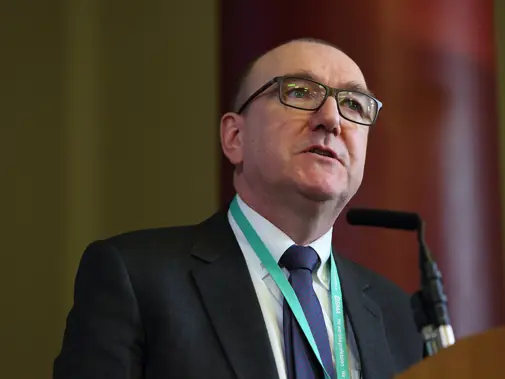Seven colleges and the Faculty of Intensive Care Medicine have joined with the association in calling on the Government and employers to take urgent action to address a ‘perfect storm’ of challenges that threaten to exacerbate existing staffing shortages of senior staff.
The warning comes as a paper published today titled Consultant workforce shortages and solutions: Now and in the Future, which outlines the challenges to consultant recruitment as well as short-, medium- and long-term solutions to this trajectory.
These include addressing inequalities in pension allowances, real-terms pay erosion and the gender pay gap, while also ensuring consultants have more say in job planning and access to flexible working arrangements.
‘Catastrophic’
In launching the paper, BMA consultants committee chair Rob Harwood (pictured) said the pressures added to the health service by the pandemic had further exposed and exacerbated the staffing problems that had already long plagued the NHS.
He warned that, unless action was taken right away, the consequences for the health service would be potentially ‘catastrophic’ in the long run.
He said: ‘The NHS was facing a huge workforce crisis long before COVID-19, with hospital consultants choosing to retire earlier, a significant proportion reaching retirement age, and a growing trend of younger doctors already deciding they’d had enough.
‘We’ve reached a position where every consultant is more precious than ever, and in the face of an unwavering global pandemic, everything must be done to retain and recruit more doctors as a matter of urgency, not only to help in the fight against COVID-19, but also the immense backlog created as a result of the virus.
Deterring doctors
‘It’s not just the BMA who has highlighted these problems, but a gamut of some of the country’s most respected medical bodies and the Government must listen. It is crucial that our recommendations are thoroughly considered, and detailed plans are drawn up to address this crisis both for now and in the future.
‘Without that, we risk creating an NHS that no one wants to work in, the consequences of which are potentially catastrophic.’
The paper is the result of a roundtable event hosted by the BMA in July, in which members of the association’s consultants committee met with representatives from medical royal colleges to discuss the future of the consultant workforce in England.
Aimed at the Government, employers and healthcare arms-length bodies, the paper sets out how pressures in the NHS and changing attitudes in the medical profession are posing challenges to maintaining the consultant workforce.
It emphasises that, while 24 per cent of the consultant workforce is over the age of 55, a recent BMA survey finds that 6 out of 10 consultants plan on retiring at or before the age of 60.
The paper also adds that while growing numbers of younger doctors are seeking alternative career paths to that of consultancy, the demand for consultants and their role in providing care is increasing.
Among the short- to medium-term measures that should be taken by ministers and employers to improve the conditions and attractiveness of the consultant grade is reforming the existing pensions taxation system, which continues to push consultants and other senior doctors into reducing their hours.
Pay and equality
The paper also calls on the Government to address stagnation in consultants’ salaries – which have seen a more than 30 per cent real-terms erosion over the past decade, and to eliminate gender disparities in pay to encourage retention of female consultants.
The BMA and colleges are also urging employers to support consultants in making changes to their job plans, allowing for greater time to be spent in training or education, and making flexible and remote working more accessible.
In the long-term, the association and its colleagues make clear that the most important action towards ensuring sustainable growth in the consultant workforce is by expanding places at medical schools, foundation programme and specialty trainee levels.
In light of the report’s publication, spokespeople for a number of the medical royal colleges have spoken out in support of its findings.
Royal College of Physicians president Andrew Goddard echoed the report’s calls for increasing medical school places as a means of increasing recruitment.
He said: ‘The size of the medical workforce is the key issue for the NHS, which is why we called for a doubling of medical school places in 2018 and will soon issue a report on the costs and feasibility. The COVID-19 pandemic has shown this in stark reality.
‘If we had more doctors, nurses and other clinicians, we would have been much better prepared to deal with the pandemic and more able to reduce health inequality across the country.’
Patient care
Royal College of Radiologists president Jeanette Dickson also welcomed the paper and called on NHS leaders to build on its recommendations.
She said: ‘The BMA report outlines key themes we have seen raised repeatedly across the consultant workforce in imaging and cancer care, both before and during the coronavirus pandemic.
‘It clearly highlights the need for greater flexibility at work and for a committed NHS culture of inclusivity, trust and shared leadership, as well as protected time for professional development and training the future workforce.
‘NHS leaders are taking steps to acknowledge and improve on these issues, but as well as measures to boost ongoing support, we must see real increases the consultant workforce in order to be able safeguard the future of patient care.’
The full list of those who contributed to the paper includes:
- Faculty of Intensive Medicine
- Royal College of Anaesthetists
- Royal College of Obstetricians and Gynaecologists
- Royal College of Paediatrics and Child Health
- Royal College of Physicians
- Royal College of Psychiatrists
- Royal College of Radiologists
- Royal College of Surgeons of England

